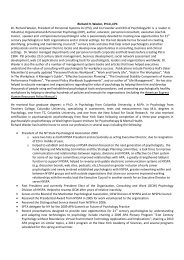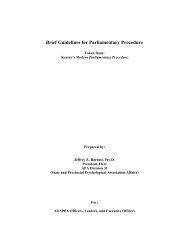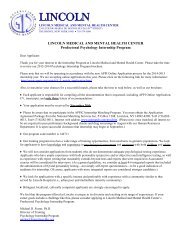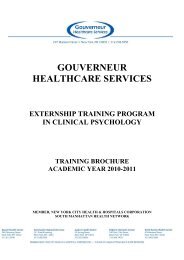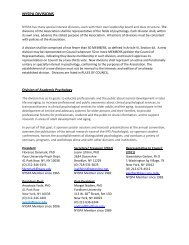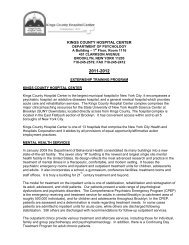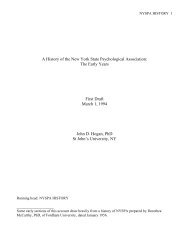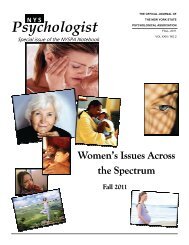NOTEBOOK - New York State Psychological Association
NOTEBOOK - New York State Psychological Association
NOTEBOOK - New York State Psychological Association
You also want an ePaper? Increase the reach of your titles
YUMPU automatically turns print PDFs into web optimized ePapers that Google loves.
www.NYSPA.org<br />
Hilton, Stern, & Manly, 2005; de Ronchi<br />
et al., 2002). Second, language is<br />
a major factor involved in test performance.<br />
As expected, extensive research<br />
shows that individuals perform<br />
best in their dominant (primary) language;<br />
however, research also indicates<br />
that being bilingual is associated<br />
with significant changes at the neuroanatomic<br />
level and on cognitive test<br />
performance. Specifically, current<br />
research indicates the existence of<br />
bilingual disadvantages on verbal<br />
tasks (i.e., naming and fluency<br />
measures) and more subtle bilingual<br />
advantages on some measures of executive<br />
functioning, specifically cognitive<br />
control (Rivera Mindt et al.,<br />
2008). Third, acculturation (i.e., the<br />
process by which individuals are influenced<br />
and changed through exposure<br />
to another culture) is another factor<br />
associated with test performance.<br />
Specifically, greater acculturation to<br />
majority (i.e., U.S.) culture among<br />
African Americans, Asian Americans,<br />
and Latinas/o has been significantly<br />
associated with better test performance<br />
in a number of cognitive<br />
domains (i.e., executive function,<br />
attention/working memory, verbal<br />
fluency, learning, memory, and<br />
processing speed; Boone et al., 2007;<br />
Coffey, Marmol, Schock, & Adams,<br />
2005). Fourth and finally, relatively<br />
recent research indicates that lower<br />
socioeconomic status is also associated<br />
with poorer cognitive test performance<br />
(e.g., Schwartz et al., 2004).<br />
My own work is dedicated to<br />
understanding the role of sociocultural<br />
factors at the intersection of neurological<br />
disease and health disparities<br />
and improving the standard of care<br />
and outcomes for undeserved and<br />
vulnerable populations. The research<br />
(Rivera Mindt et al., 2008) of myself<br />
and my collaborators indicates that<br />
quality of education completely attenuates<br />
ethnic minority (Latina/o vs.<br />
non-Hispanic white) between-group<br />
performance differences in global<br />
neuropsychological functioning and<br />
the domains of learning and attention/working<br />
memory. Our more<br />
recent research (Arentoft et al., in<br />
press) also supports prior work on the<br />
important association between acculturation<br />
and test performance.<br />
In summary, psychologists are<br />
being increasingly called upon to<br />
evaluate and serve individuals from<br />
diverse backgrounds. The literature<br />
on the role of sociocultural factors in<br />
neuropsychological test performance<br />
clearly indicates that clinicians and<br />
researchers alike should take these<br />
factors into account when evaluating<br />
racial/ethnic minority individuals and<br />
likely others from nontraditional and<br />
underserved backgrounds (e.g., rural<br />
populations, immigrants who may not<br />
count as “racial/ethnic” minority<br />
based on current classifications).<br />
Psychologists may increase cultural<br />
competence for conducting evaluations<br />
with racial/ethnic minority<br />
clients by seeking specialty training,<br />
continuing education, and mentorship<br />
opportunities and through involvement<br />
in professional organizations.<br />
Although current guidelines (see Rivera<br />
Mindt et al., 2010) for conducting<br />
neuropsychological evaluations with<br />
ethnic minorities are limited and in<br />
need of revision, they should serve as<br />
an indispensable resource for neuropsychologists<br />
who work with ethnic<br />
minority clients.<br />
Recommended Reading<br />
Llorente, A. M. (2008). Principles of<br />
neuropsychological assessment with<br />
Hispanics: Theoretical foundations<br />
and clinical practice. <strong>New</strong> <strong>York</strong>:<br />
Springer Science Business Media, LLC.<br />
Manly, J. J., & Jacobs, D. (2002).<br />
Future directions in neuropsychological<br />
assessment with African<br />
Americans. In R. Ferraro (Ed.), Minority<br />
and cross-cultural aspects of neuropsychological<br />
assessment (pp. 79-96).<br />
Lisse, the Netherlands. Swets &<br />
Zeitlinger.<br />
Reynolds, C. R., Fletcher-Janzen, E., &<br />
Strickland, T. L. (Eds.). (2000).<br />
Handbook of cross-cultural neuropsychology.<br />
Dordrecht, the Netherlands:<br />
Kluwer Academic Publishers.<br />
References are available on request.<br />
Monica Rivera Mindt, Ph.D., is a<br />
Professor of Psychology at Fordham<br />
University with a joint appointment in<br />
the Departments of Neurology and<br />
Psychiatry at the Mount Sinai School<br />
of Medicine. She can be contacted at<br />
rivermindt@fordham.edu.<br />
7



